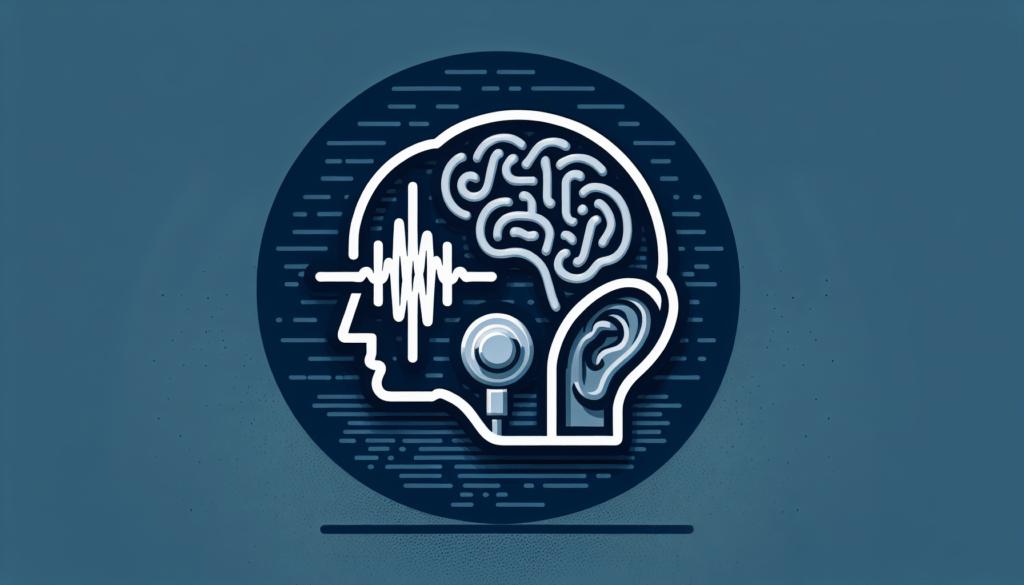Imagine waking up one morning to discover that the world around you is suddenly quiet. Conversations become muffled whispers, birdsong fades into the background, and the melodies of your favorite songs are distant echoes. This is the reality for millions of people who are experiencing hearing loss, a condition that not only affects their ability to hear but also has a surprising connection to dementia. In this article, we will explore the link between hearing loss and dementia, shedding light on the importance of early detection and intervention. So, grab a cup of tea, settle into a cozy spot, and let’s unravel this fascinating connection together.

Definition of Hearing Loss and Dementia
Hearing Loss
Hearing loss refers to a partial or complete inability to hear sounds. It can affect one or both ears and can vary in severity from mild to profound. Hearing loss can occur at any age and can be caused by various factors such as genetic conditions, exposure to loud noises, infections, or certain medications.
Dementia
Dementia is not a specific disease but rather an umbrella term for a range of cognitive disorders that affect memory, thinking, behavior, and the ability to perform daily activities. People with dementia may experience a decline in memory, language skills, problem-solving abilities, and overall cognitive function. Alzheimer’s disease is the most common cause of dementia, but there are other types, including vascular dementia and Lewy body dementia.
Prevalence of Hearing Loss and Dementia
Global Prevalence
Hearing loss and dementia are two significant global public health issues. According to the World Health Organization (WHO), over 466 million people worldwide have disabling hearing loss, and this number is expected to increase to over 900 million by 2050. Dementia affects approximately 50 million people worldwide, with nearly 10 million new cases reported every year.
Impact of Aging on Prevalence
As individuals age, the likelihood of both hearing loss and dementia increases. Age-related hearing loss, known as presbycusis, affects more than one-third of people over the age of 65 in the United States. Similarly, the risk of developing dementia doubles every five years after the age of 65. The aging population, therefore, amplifies the prevalence of both hearing loss and dementia.
Understanding Hearing Loss
Types of Hearing Loss
There are three main types of hearing loss: conductive, sensorineural, and mixed. Conductive hearing loss occurs when there is a problem with the transmission of sound waves from the outer or middle ear to the inner ear. Sensorineural hearing loss, on the other hand, is caused by damage to the inner ear or auditory nerve. Mixed hearing loss is a combination of both conductive and sensorineural hearing loss.
Causes of Hearing Loss
Hearing loss can be caused by various factors, including genetic conditions, exposure to loud noises, infections, trauma or injury to the ear, certain medications, and age-related degeneration. Additionally, certain medical conditions such as diabetes, cardiovascular diseases, and autoimmune disorders may contribute to hearing loss.
Understanding Dementia
Types of Dementia
Dementia can be categorized into different types based on their causes and symptoms. Alzheimer’s disease, the most common type of dementia, is characterized by the accumulation of amyloid plaques and tau tangles in the brain. Vascular dementia is caused by reduced blood flow to the brain, often from strokes or other vascular problems. Lewy body dementia is characterized by the presence of abnormal protein deposits called Lewy bodies in the brain.
Causes of Dementia
The causes of dementia vary depending on the type. Alzheimer’s disease is thought to be caused by a combination of genetic, environmental, and lifestyle factors. Vascular dementia is usually caused by damaged blood vessels in the brain, while Lewy body dementia is associated with the buildup of abnormal proteins. Other less common causes of dementia include frontotemporal dementia, Parkinson’s disease dementia, and Huntington’s disease.

The Connection Between Hearing Loss and Dementia
Correlation Studies
Numerous studies have found a correlation between hearing loss and cognitive decline, including the development of dementia. A study published in JAMA Internal Medicine in 2013 found that individuals with hearing loss had a significantly higher risk of developing dementia compared to those with normal hearing. This correlation remained even after accounting for other factors such as age, sex, and education level.
Shared Risk Factors
Several risk factors for both hearing loss and dementia overlap, suggesting a shared etiology. For instance, cardiovascular diseases and diabetes, which are known risk factors for dementia, can also contribute to hearing loss. Additionally, social isolation and a sedentary lifestyle, often associated with hearing loss, have been linked to cognitive decline. The presence of shared risk factors further strengthens the connection between hearing loss and dementia.
Impact of Hearing Loss on Cognitive Abilities
Processing Speed
Hearing loss can significantly impact an individual’s processing speed, which refers to the ability to quickly understand and respond to information. When hearing is compromised, the brain has to work harder to process sounds, leading to slower cognitive processing. This can result in delayed reactions, difficulty following conversations, and reduced overall cognitive efficiency.
Working Memory
Working memory refers to the ability to hold and manipulate information in the mind over short periods. Hearing loss can affect working memory as individuals may struggle to remember instructions, names, or details of a conversation. The effort required to compensate for hearing loss can overload the working memory, leading to decreased cognitive performance.
Attention and Focus
Hearing loss can also impact an individual’s attention and focus. Background noise or difficulty hearing certain sounds can be distracting, making it challenging to concentrate on tasks or conversations. As a result, individuals with hearing loss may experience reduced attention spans and difficulties in maintaining focus, which can affect overall cognitive abilities.

Role of Cognitive Load in Hearing Loss and Dementia
Cognitive Load Theory
Cognitive load refers to the amount of mental effort required to complete a task. According to the Cognitive Load Theory, when the cognitive load exceeds an individual’s working memory capacity, their ability to process information and learn is compromised. In the case of hearing loss, individuals may experience increased cognitive load as they must allocate additional cognitive resources to compensate for hearing difficulties.
Association with Dementia Progression
Studies have suggested that the increased cognitive load associated with hearing loss may contribute to the progression of dementia. The constant strain on cognitive resources to comprehend sounds can divert attention away from other cognitive processes, potentially accelerating cognitive decline. Furthermore, the social isolation often observed in individuals with untreated hearing loss further exacerbates cognitive load and may contribute to the development or progression of dementia.
Is Hearing Loss a Risk Factor for Dementia?
Longitudinal Studies
Longitudinal studies tracking individuals over an extended period have provided further evidence of the link between hearing loss and dementia. These studies have consistently shown that individuals with untreated hearing loss are more likely to develop dementia compared to those who address their hearing loss with interventions such as hearing aids or cochlear implants.
Causal Relationship
While correlation between hearing loss and dementia is well-established, the exact nature of the relationship remains a topic of ongoing research. It is currently unclear whether hearing loss directly causes dementia or if both conditions share common underlying causes that contribute to their co-occurrence. Further research is needed to establish a causal relationship definitively.

Managing Hearing Loss to Reduce Dementia Risk
Hearing Aids and Cochlear Implants
Addressing hearing loss with appropriate interventions, such as hearing aids or cochlear implants, can significantly improve communication abilities and reduce cognitive load. These devices amplify sounds and enhance speech perception, allowing individuals to effectively engage in conversations and maintain social connections. By alleviating the cognitive strain associated with untreated hearing loss, the risk of dementia may be reduced.
Auditory Training
Auditory training programs are designed to strengthen specific listening skills and improve speech comprehension. These programs utilize various exercises and techniques to enhance auditory processing abilities, including auditory memory, discrimination, and attention. By actively engaging in auditory training, individuals with hearing loss can optimize their listening abilities and potentially mitigate cognitive decline.
Communication Strategies
Effective communication strategies can help individuals with hearing loss mitigate the cognitive challenges associated with their condition. Simple techniques such as facing the person you are speaking to, minimizing background noise, and using visual cues can improve understanding and reduce cognitive load. Additionally, seeking environments with good acoustics and utilizing assistive listening devices can further enhance communication and cognitive performance.
Addressing Dementia in Individuals with Hearing Loss
Assistive Technologies
Assistive technologies, such as wearable devices and smartphone apps, can aid individuals with hearing loss in managing their overall cognitive functioning while coping with dementia-related challenges. These technologies offer features like reminders, navigation assistance, and memory aids, which can support individuals in their daily activities and help compensate for cognitive impairments.
Multidisciplinary Approaches
Given the complex nature of hearing loss and dementia, a multidisciplinary approach involving healthcare professionals, audiologists, speech-language therapists, and caregivers is essential for holistic management. This approach allows for comprehensive assessment, intervention, and support tailored to the specific needs and goals of each individual.
In conclusion, hearing loss and dementia are significant global health concerns that often coexist. While the precise mechanisms linking the two conditions require further exploration, research consistently demonstrates a correlation and shared risk factors. The impact of hearing loss on cognitive abilities, cognitive load theory, and longitudinal studies highlight the importance of managing hearing loss to reduce the risk of dementia. By addressing hearing loss through interventions like hearing aids, auditory training, and effective communication strategies, individuals can alleviate cognitive load and potentially mitigate the progression of dementia. Moreover, a multidisciplinary approach is crucial in addressing dementia in individuals with hearing loss, ensuring comprehensive care and support.
